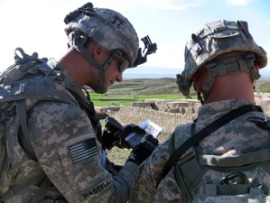 I was stunned to learn that the unemployment rate among veterans returning from Iraq and Afghanistan is up to 12.1%. That’s more than 3% higher than the national average. The more I looked into it, the more misconceptions I discovered employers had about military experience.
I was stunned to learn that the unemployment rate among veterans returning from Iraq and Afghanistan is up to 12.1%. That’s more than 3% higher than the national average. The more I looked into it, the more misconceptions I discovered employers had about military experience.
A few weeks ago, Mark Norton, my friend and coworker at McKinney Rogers, asked me a great question. He was preparing a speech to a group of Japanese businessmen in Tokyo and asked me which aspects of military leadership I thought were most applicable to business leaders.
I came up with four things on the spot that I learned in the Army that I’ve seen lacking in the corporate and non-profit worlds. I’ve since added one more. Here they are:
1. Develop Junior Leaders. Junior officers and NCOs win today’s battles. Developing their judgment and empowering them to take initiative enables decentralized execution—which gives organizations the agility needed to operate in highly complex, rapidly changing environments (sound familiar?).
2. Leverage “Commanders Intent.” As Ike said, “Plans are nothing. Planning is everything.” Understanding the leader’s intent—her purpose, key outcomes, and defined endstate—empowers individuals and teams to adapt, improvise, and succeed.
3. Task Organize. Missions and teams are not all created equal. Form specific teams to achieve specific outcomes. Establish universal standards and train people to operate globally in different multifunctional teams.
4. Use your Operators as Trainers. In the military, training falls under operations—not HR. Operators understand what skills the field needs, and they’re the natural choice to teach those skills. Human Resources tracks and records individual progress, but never delivers or resources training.
5. Focus on “Mission first, People always.” The forced choice between making your numbers or caring for your direct reports is a false dichotomy. Taking care of your people is taking care of business. Likewise, taking care of business is taking care of people.
Don’t assume that a veteran’s experience is void of business relevance. There are exceptions of course, but the vast majority of veterans have learned to get results by working hard, thinking creatively, and taking care of people.
I don’t know about you, but I’d take someone like that on my team any day.
What other aspects of military leadership do you think would benefit business leaders?
- Click to share on X (Opens in new window) X
- Click to share on Facebook (Opens in new window) Facebook
- Click to share on LinkedIn (Opens in new window) LinkedIn
- Click to share on Reddit (Opens in new window) Reddit
- Click to email a link to a friend (Opens in new window) Email
- Click to print (Opens in new window) Print